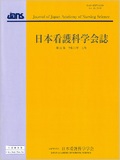Japanese
English
- 販売していません
- Abstract 文献概要
- 参考文献 Reference
要旨
目的:強迫症状をもつ患者のリカバリープロセスを明らかにし看護支援について考察する.
方法:国内で出版された体験記7件を対象にグラウンデッド・セオリー・アプローチ(Strauss & Corbin版)を用いて分析した.
結果:現象の【中心となるカテゴリー】の【医療機関受診を継続することへの自問】とそれを説明する7つの《サブカテゴリー》,3つのストーリーラインが抽出された.抽出されたプロセスは(1)治療が奏効し回復に至るルート(2)受診に伴う負荷が大きく受診を中断し症状が悪化するルート(3)期待に見合う症状の改善がみられないため受診を中断し自ら症状改善のための方策を模索することで回復に至るルートであった.
結論:3つのプロセスが明らかとなり治療による症状改善と主体性の回復,回復に向けた主体的な行動,価値観の変容が重要と考えられ,看護職は患者の受診継続と主体的な行動を支援する必要性が示唆された.
Aim: The purpose of this study was to describe the recovery process of patients with symptoms of obsessions and/or compulsions and discuss nursing support.
Methods: Seven illness narratives published in Japan were analyzed by using the grounded theory approach (Strauss & Corbin version).
Results: One core category, which is “Asking oneself about the continuation of the consultation with medical institutions”, seven subcategories which explain core category, and three storylines were generated from analysis of illness narratives. The extracted three storylines were as follows.
(1) The first route shows patients who visited medical institutions and were successfully treated.
(2) The second route shows the exacerbation of symptoms by discontinuing medical treatment because of the burden that patients experience during their visits to medical institutions.
(3) The third route shows patients' recovery by seeking measures to improve their symptoms instead of discontinuing medical treatment.
Conclusions: Three recovery processes are described. For patients' recovery, several factors are important, including improvement of symptoms and recovery of personal autonomy through treatment, acceptance of their current situation, and change of perception about their outlook on life with illness. This suggests there is a need for nursing support for patients, so they may continue to receive treatment and regain their autonomy.
Copyright © 2021, Japan Academy of Nursing Science. All rights reserved.


